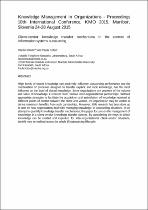 ResearchSpace
ResearchSpace
Client-vendor knowledge transfer mechanisms in the context of information systems outsourcing
JavaScript is disabled for your browser. Some features of this site may not work without it.
- ResearchSpace
- →
- Research Publications/Outputs
- →
- Conference Publications
- →
- View Item
| dc.contributor.author |
Smuts, H

|
|
| dc.contributor.author |
Kotzé, Paula

|
|
| dc.date.accessioned | 2016-07-11T10:59:21Z | |
| dc.date.available | 2016-07-11T10:59:21Z | |
| dc.date.issued | 2015-08 | |
| dc.identifier.citation | Smuts, H and Kotzé, P. 2015. Client-vendor knowledge transfer mechanisms in the context of information systems outsourcing. In: Knowledge Management in Organizations - Proceedings 10th International Conference, KMO 2015, Maribor, Slovenia 24-28 August 2015, vol 224, pp 102-119 | en_US |
| dc.identifier.isbn | 978-3-319-21008-7 | |
| dc.identifier.uri | http://link.springer.com/chapter/10.1007%2F978-3-319-21009-4_9 | |
| dc.identifier.uri | http://hdl.handle.net/10204/8635 | |
| dc.description | Knowledge Management in Organizations - Proceedings 10th International Conference, KMO 2015, Maribor, Slovenia 24-28 August 2015. Due to copyright restrictions, the attached PDF file only contains the abstract of the full text item. For access to the full text item, please consult the publisher's website | en_US |
| dc.description.abstract | High levels of shared knowledge can positively influence outsourcing performance and the combination of processes designed to transfer explicit and tacit knowledge, has the most influence on the level of shared knowledge. Some organisations are unaware of the volume and value of knowledge it receives from various inter-organisational partnerships. Without appropriate strategies to facilitate the acquisition and assimilation of knowledge received at different points of contact between the client and vendor, the organisation may be unable to derive maximum benefits from such partnerships. However, little research has been done up to date on how organisations deal with managing knowledge in outsourcing situations. In an attempt to quantify knowledge transfer mechanisms, this paper focuses on the management of knowledge in a client-vendor knowledge transfer context. By considering the ways in which knowledge can be created and exploited for inter-organisational client-vendor situations, benefit may be realised across the whole IS outsourcing lifecycle. | en_US |
| dc.language.iso | en | en_US |
| dc.publisher | Springer International Publishing | en_US |
| dc.relation.ispartofseries | Workflow;15874 | |
| dc.subject | Knowledge transfer | en_US |
| dc.subject | Client-vendor knowledge | en_US |
| dc.subject | Information systems | en_US |
| dc.subject | IS outsourcing | en_US |
| dc.title | Client-vendor knowledge transfer mechanisms in the context of information systems outsourcing | en_US |
| dc.type | Conference Presentation | en_US |
| dc.identifier.apacitation | Smuts, H., & Kotzé, P. (2015). Client-vendor knowledge transfer mechanisms in the context of information systems outsourcing. Springer International Publishing. http://hdl.handle.net/10204/8635 | en_ZA |
| dc.identifier.chicagocitation | Smuts, H, and Paula Kotzé. "Client-vendor knowledge transfer mechanisms in the context of information systems outsourcing." (2015): http://hdl.handle.net/10204/8635 | en_ZA |
| dc.identifier.vancouvercitation | Smuts H, Kotzé P, Client-vendor knowledge transfer mechanisms in the context of information systems outsourcing; Springer International Publishing; 2015. http://hdl.handle.net/10204/8635 . | en_ZA |
| dc.identifier.ris | TY - Conference Presentation AU - Smuts, H AU - Kotzé, Paula AB - High levels of shared knowledge can positively influence outsourcing performance and the combination of processes designed to transfer explicit and tacit knowledge, has the most influence on the level of shared knowledge. Some organisations are unaware of the volume and value of knowledge it receives from various inter-organisational partnerships. Without appropriate strategies to facilitate the acquisition and assimilation of knowledge received at different points of contact between the client and vendor, the organisation may be unable to derive maximum benefits from such partnerships. However, little research has been done up to date on how organisations deal with managing knowledge in outsourcing situations. In an attempt to quantify knowledge transfer mechanisms, this paper focuses on the management of knowledge in a client-vendor knowledge transfer context. By considering the ways in which knowledge can be created and exploited for inter-organisational client-vendor situations, benefit may be realised across the whole IS outsourcing lifecycle. DA - 2015-08 DB - ResearchSpace DP - CSIR KW - Knowledge transfer KW - Client-vendor knowledge KW - Information systems KW - IS outsourcing LK - https://researchspace.csir.co.za PY - 2015 SM - 978-3-319-21008-7 T1 - Client-vendor knowledge transfer mechanisms in the context of information systems outsourcing TI - Client-vendor knowledge transfer mechanisms in the context of information systems outsourcing UR - http://hdl.handle.net/10204/8635 ER - | en_ZA |





